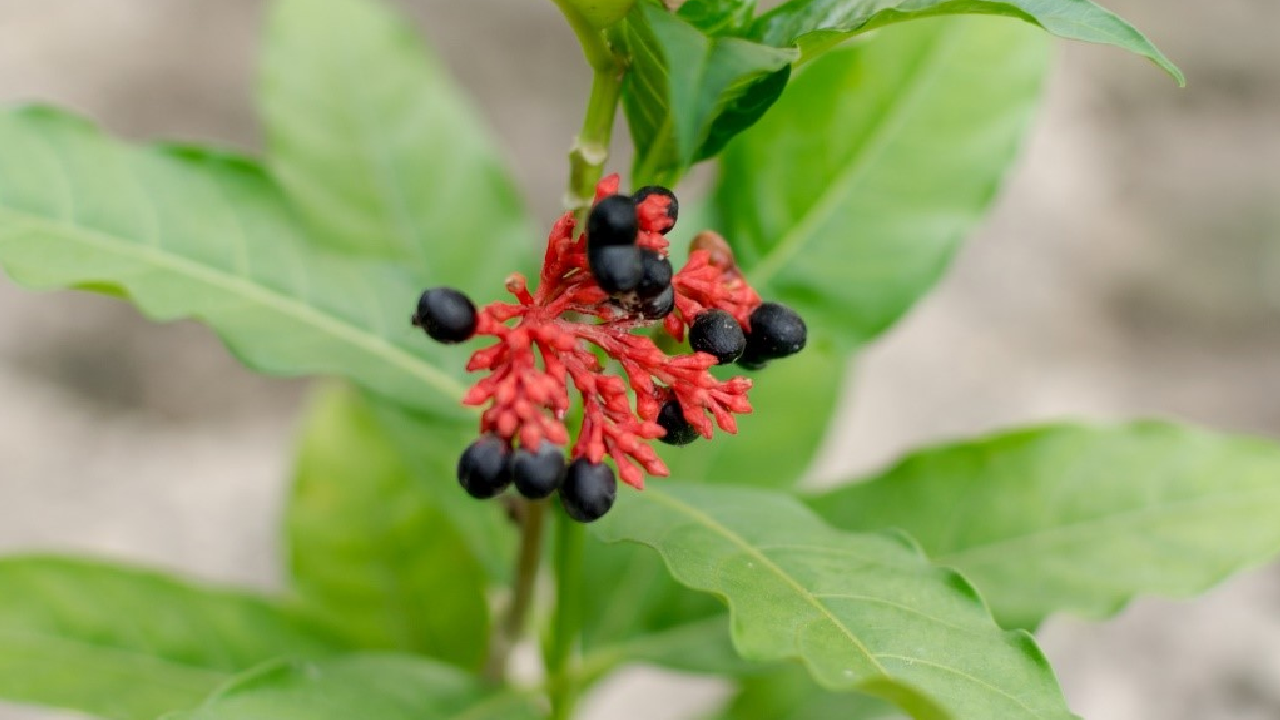
Sarpagandha, scientifically known as Rauwolfia serpentina, is a perennial under-shrub commonly referred to as Indian snakeroot in English, Chhotachand in Hindi, and Sarpagandha in Sanskrit. This plant is cultivated for its significant medicinal properties, particularly its roots, which have been used extensively in traditional medicine for centuries.
Geographic Distribution
Sarpagandha is native to India and is found in various regions across the country. The plant thrives in the sub-Himalayan tracts up to an altitude of 1,000 meters and is also found in the lower ranges of the Eastern and Western Ghats. Additionally, Sarpagandha grows in the Andaman Islands. It grows fairly wild in the United Provinces, Bihar, and the Eastern and Western Ghats.
Medicinal Properties of Sarpagandha
Sarpagandha has a long history of use in Indian medicine, with its roots being the most economically valuable part. The plant contains over 200 alkaloids, including reserpine, ajmaline, ajmalicine, and serpentine, which contribute to its potent medicinal effects. The key medicinal properties of Sarpagandha are:
-
Blood Pressure Management: Sarpagandha is renowned for its ability to manage high blood pressure. Reserpine, one of its primary alkaloids, is used in modern medicine to treat hypertension effectively.
-
Mental Health: The plant is effective in alleviating symptoms of mental illnesses such as schizophrenia and anxiety. Its sedative properties help calm the mind, reducing agitation and stress.
-
Nervous System Disorders: Sarpagandha is used to treat various nervous system disorders, including insomnia, epilepsy, fits, and maniacal behavior associated with psychosis. Its hypnotic and sedative properties are beneficial in managing these conditions.
-
Other Therapeutic Uses: In addition to its primary uses, Sarpagandha provides relief from fever, diarrhea, dysentery, and cholera. Traditionally, it has also been used as an antidote for the bites of poisonous reptiles and insects.
Herbal Preparations
Sarpagandha is used in various herbal formulations. Here are some common preparations:
-
Sarpagandha Churna: This powdered form of the roots is often used to manage high blood pressure and mental disorders. It can be consumed with water or combined with other herbal powders for enhanced effects.
-
Sarpagandha Kwath: A decoction made from the roots, Sarpagandha Kwath is known for its sedative and calming effects. It is prepared by boiling the roots in water and reducing the liquid to concentrate the active compounds, providing a potent herbal remedy.
-
Sarpagandha Tablets: Standardized tablets made from the root extract offer a convenient way to consume the herb. These tablets are commonly used to treat hypertension and anxiety, providing a measured dose of the plant's beneficial compounds.
Sarpagandha, with its rich medicinal properties and versatile herbal preparations, serves as a recommended herbal plant for your garden. Its ability to treat a wide range of ailments, from high blood pressure to mental health disorders, shows its significance. The various preparations of Sarpagandha ensure that its benefits can be harnessed in multiple ways, making it a valuable herb in the realm of natural medicine. Its wide geographic distribution in India further highlights the plant's adaptability and importance in various ecosystems.
















